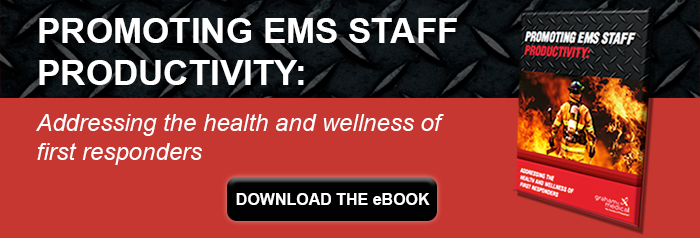 When emergency responders experience burnout, it's no joke. An Australia survey found 36% of their paramedics suffered from depression. And depression can lead to suicide. One Chicago fire department experienced seven suicides in an 18 month period. Mental health issues have become such a serious problem that a survey of 4,000 first responders revealed that 6.6% had attempted suicide, a number over 10 times higher than the general population.
When emergency responders experience burnout, it's no joke. An Australia survey found 36% of their paramedics suffered from depression. And depression can lead to suicide. One Chicago fire department experienced seven suicides in an 18 month period. Mental health issues have become such a serious problem that a survey of 4,000 first responders revealed that 6.6% had attempted suicide, a number over 10 times higher than the general population.
While these numbers are not good, early interventions can make a difference in EMS health and safety, providing help before the problem gets worse. Chiefs, Directors, and other management can take steps to recognize signs of burnout, depression, and stress, as can coworkers. Diagnosing and treating these conditions may make all the difference.
EMS Career Choice: A Perfect Storm of Stress
The nature of the job creates stress from many different angles. First responders like EMT and paramedics, may deliver a baby in the first hours of a shift, assist an angry drunk after a bar fight, and then follow up by providing triage after a house fire. Don't forget car accidents, neglect, domestic violence, and even people who are just lonely and forgotten.
Take these adrenaline-packed events and then combine this with infrequent meals and lack of sleep. Long shifts can make it difficult to create healthy routines and firefighters may smoke or use smokeless tobacco to relieve stress. There is also a culture prevalent across many of these professions that showing weakness (like mental health issues) is bad and could affect their job.
All of these things combine to create a perfect storm of stress and can manifest in different ways.
First Responder Burnout
Probably the most common complaint about EMS health and safety is that burnout happens at some point in the careers of most first responders. Burnout frequently occurs around the five-year mark. It seems like prolonged stress combines with long hours and relatively low pay (depending).
It's easy to get fed up with nasty drunks and combative patients, and this stress can take a toll. While some people see burnout as the last step in a career, others view this as a manageable situation if properly addressed. Burnout can affect productivity on the job (lack of motivation) as well as attention to detail and even worker safety.
Burnout that is not acknowledged can also lead to depression.
Depression
Constantly dealing with fear, stress, and the apathy or hopelessness of burnout can lead to depression. Depression is a serious EMS health and safety issue that can lead to the higher suicide rates above. In addition, first responders are also subject to developing PTSD and have been compared in many ways to veterans returning from a war.
Treating depression must begin in-house. When recognized, this condition can usually be managed with counseling, medication, or even much-needed rest. Managers are asked to both encourage employees to speak up when dealing with mental health issues and also to look for signs of depression and burnout in employees that are uncomfortable speaking.
Burnout and depression are just a couple of several health risks associated with the EMS professional. To learn about other occupational health risks in the EMS profession and proven ways to combat them, read our recent eBook, Promoting EMS Staff Productivity: Addressing the Health and Wellness of First Responders.
Graham Medical, makers of the MegaMover® Transport Units, is concerned for the emotional, as well as physical, health and well-being of all first responders. We recognize how taxing your job is in so many different ways and take seriously our role in stress reduction.

